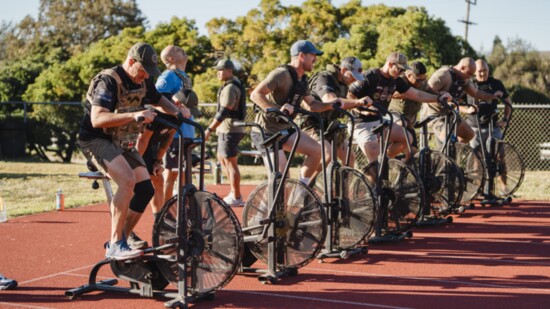Police recruit class is intense. It's a lot of running, and the soon-to-be officers undergo stringent exercises. But then, it’s up to each officer to keep that lifestyle going. As time passes, the late night shifts, eating habits, and stress keep most officers from staying in shape.
In 2021, the Hawai’i Police Department (HPD) tried to improve this by meeting quarterly to maintain physical standards in its Special Response Team (SRT), formerly known as SWAT. But in doing so, Officer Jeremy Scott Lewis tore his Achilles during a test track. After the surgery, a friend called him one day and invited him to bring his kids to the University of the Nations, where the Konawaena High School football team was training.
“I was at home on my back, with a boot on my leg, not feeling great. So I took the kids down, and there I met Tiger Hill, who asked about my injury and told me to come back on Monday to do physical training together. That's how our relationship started,” recalls Lieutenant Lewis.
Tiger Hill, also born in O’ahu, moved to the Big Island in 2013 with his pregnant wife and son, knowing this would be their home. He grew up playing football, baseball, basketball, soccer, volleyball, and canoeing. Yet, his passion for training didn’t come from a natural talent to play sports, but from his desire to excel alongside others.
“Training creates brotherhood,” Tiger says. “You train with guys regularly and feel like they're down for you, and you're down for them. I like finding a group of guys I know who want to do crazy stuff. They want to push, you know?”
Through the exercises Tiger tailored, in just five months, Officer Lewis went from being unable to put his foot on the ground to returning to work, fully recovered. He was so surprised by his rehab that he talked to his lieutenant about bringing the SRT to work out with Tiger at the University of the Nations, Kona. After a long day of exercise, Tiger approached him with an idea. What if he could train not only Officer Lewis but the entire Hawai’i Police Department?
Although initially met with skepticism, the initiative was ultimately implemented. Tiger drove his truck around the island, bringing dumbbells, sandbags, and bikes wherever the officers gathered. “He followed us every Monday, voluntarily,” Lieutenant Lewis reflects.
Since then, the HPD has shifted gears toward a fitness culture involving the community whenever possible. The result is collaborations that range from witnesses being willing to report what they know, to parents encouraging their children to seek out careers in law enforcement.
In the meantime, Tiger started the Hawai'i Fitness Foundation, a non-profit organization to work closely with Service Response Teams in Maui, Kauai, O’ahu, and the Big Island, flying regularly to run PT programs in those locations. Alongside Lieutenant Aaron Carvalho, Tiger organized statewide first responders events, including team development activities, debriefing, and tactical games — moving sandbags, going over walls, and shooting targets.
These actions deepened the bonds among the HPD and increased the sense of camaraderie. “The relationship developed between people engaging in physical activity together can break down barriers and allow them to talk about things that maybe they wouldn't normally talk about with their co-workers or families,” says Chief Benjamin Moszkowicz, who has served the HPD since 2000.
Tiger points out that sharing daily struggles with peers who see each other as brothers and understand the realities of the job can make a big difference. But without that emotional outlet, the life expectancy of officers when they retire is dramatically shorter than that of the rest of the population.
“Many of these guys plummet. Heart attack, cancer, suicide, right when their career is done. These men and women essentially serve the better years of their lives in our community,” Tiger says. Yet, he aims to flip this situation and provide the first responders with a healthy future.
As many officers deal with traumatic situations during their shifts, it is understandable that the last thing they’ll want to do afterward is work out. That’s where Tiger meets them with the right equipment and routine. “I want healthy cops, firefighters and lifeguards, right? Because it benefits me and my family by having these guys who serve our community physically, emotionally, mentally, and spiritually healthy,” he adds.
Although he upgraded to a van to drive to Hilo and Waimea, Tiger dreams of having a mobile gym in every county: Maui, Kauai, and O’ahu, to keep offering physical exercise. While he reaches that goal, the next step in his life mission is training the Fire Department, Lifeguards and Ocean Safety Department, and the Department of Land and Natural Resources.
“The standard of what it means to be a first responder is going up,” Tiger concludes. “We're seeing glimpses of it on the other islands, and I think it's just gonna grow. Firefighters and police officers will start seeing the training rise.”
Learn more at HIFirstResponder.com, or watch the workout videos on the Instagram account @hifirstresponder.
Hawai'i Fitness Foundation Services
- Training Sessions for small group police units, fire stations, and SWAT teams with flexible scheduling to accommodate the needs of first responders.
- Specialized training for emergency personnel tailored to the physical demands of police officers, SWAT teams, firefighters, and first responders. It improves strength, agility, endurance, and stress management.
- Fitness events/collaborations with local community organizations.
The standard of what it means to be a first responder is going up — Tiger Hill.
